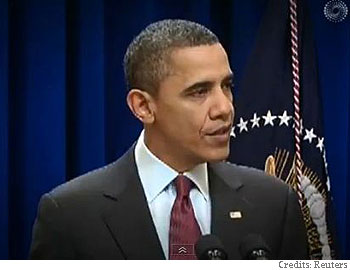 Bruce raises a number of interesting points in his post on whether having a regular question time of the president by Congress similar to the questions asked of the prime minister by the House of Commons in the U.K. would be a good idea. And you have to love Bruce’s idea of having the president also be able to ask questions of members of Congress.
Bruce raises a number of interesting points in his post on whether having a regular question time of the president by Congress similar to the questions asked of the prime minister by the House of Commons in the U.K. would be a good idea. And you have to love Bruce’s idea of having the president also be able to ask questions of members of Congress.
But in spite of all of the enthusiasm for the idea that became evident immediately after the president did more than hold his own at a televised Q&A session at the GOP retreat last week, including a bipartisan group of journalists and others publicly requesting that the practice occur regularly, it’s a safe bet that it’s not going to happen, or at least not happen any time soon.
The reason: The GOP made a huge communications mistake when it allowed the Q&A session with the president to be televised and isn’t likely to repeat it any time soon.
In fact, there were two mistakes, both of which were right out of a Communications For Dummies text.
First, news occurs when there is a controversy of some kind and the Q&A session displayed controversies galore with the president clearly in command.
Second, the GOP gave the president a forum he wouldn’t have had if the session had not been televised.
Think of what would have occurred had the session not been televised or covered by other journalists. After the meeting, GOP leaders would have held a press conference at which they would have characterized the president’s remarks rather than having the media do it. More important, they mostly would have used that very well-attended press conference to deliver their own messages about the substantial differences Republicans have with the president’s policies, how disappointed they were in his continued refusal to work with them, etc).
Instead, Republicans ended up taking backseat at their own retreat. The stories were about what Obama said; the president’s detailed knowledge of the issues and the GOP’s positions; and how the president walked into the lions’ den, took the discussion right to the Republicans, and pointed out the GOP’s inconsistencies.
And in today’s world of social media, individual Republican members of Congress at the retreat would have been tweeting their own characterizations of what the president said and being a primary source of information about the event while he was still responding to their questions. By the time the president talked to reporters, the news would have already been out and it would have been about the GOP’s reactions.
As Bruce said, it is standard strategy for underdogs to demand to debate with, in Bruce’s words, “the leader” because they typically are “elevated” in the process. That is, after all, what happened in Obama’s first debate with John McCain: They seemed at least equally as presidential when they appeared on the stage together and almost all questions about whether Obama was equal to the job instantly disappeared.
Question time would be different, however. The president will be the only one at the podium with the presidential seal in front as he looks into the camera and responds By contrast, the questioners will be seated in a group facing him. There’s simply no way for the GOP to look as strong and leader-like in that situation.
Because of all this, my guess is that the White House will be far more interested in question time than the Republicans. The Republican leadership will be the one that shoots it down.
- Bulenox: Get 45% to 91% OFF ... Use Discount Code: UNO
- Risk Our Money Not Yours | Get 50% to 90% OFF ... Use Discount Code: MMBVBKSM
Disclaimer: This page contains affiliate links. If you choose to make a purchase after clicking a link, we may receive a commission at no additional cost to you. Thank you for your support!


Leave a Reply